Introduction: Unlocking the Power of the Memory Mushroom
In an age where cognitive health is increasingly prioritized alongside physical fitness, the search for natural ways to enhance memory and mental clarity has led to the rising popularity of the memory mushroom. Known for its potent neuroprotective and cognitive-boosting properties, this remarkable fungus has become a staple in the world of nootropic mushrooms. From ancient traditional medicine to modern scientific research, memory mushrooms are now celebrated for their ability to support sharper focus, long-term memory, and overall brain health. As researchers continue to explore their effects, a growing body of evidence suggests that these mushrooms offer a powerful, natural alternative to synthetic cognitive enhancers. This article delves deep into the benefits of memory mushrooms, examining the mechanisms, applications, and science behind their cognitive support capabilities.
You may also like: The Ultimate Guide to the Best Nootropic Mushrooms for Memory and Cognitive Enhancement
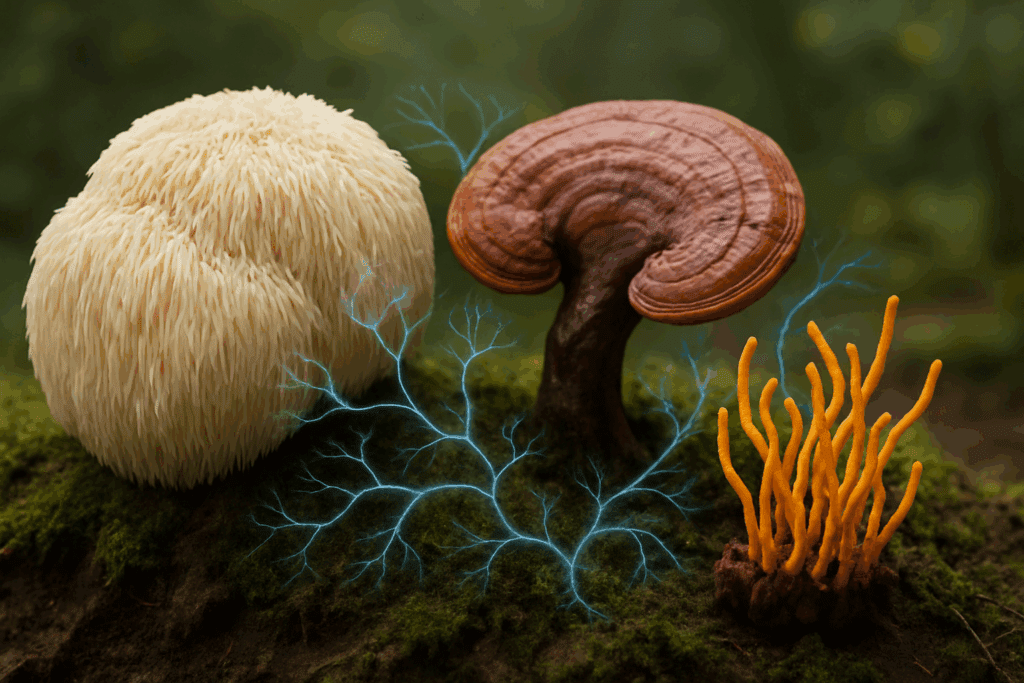
What Is a Memory Mushroom and Why Does It Matter?
The term “memory mushroom” typically refers to a group of functional fungi known for their cognitive-enhancing properties, especially their ability to support memory formation and recall. One of the most well-known species in this category is Hericium erinaceus, commonly referred to as Lion’s Mane. This particular mushroom has attracted significant scientific attention due to its bioactive compounds that promote nerve regeneration and neuroplasticity. Other mushrooms such as Reishi, Cordyceps, and even some lesser-known varieties also contribute to brain health through antioxidant, anti-inflammatory, and neuroprotective effects.
The significance of memory mushrooms lies in their ability to interact with key neurological pathways. They often stimulate the production of Nerve Growth Factor (NGF), a protein vital for the growth, maintenance, and survival of neurons. NGF plays a crucial role in the development of the central and peripheral nervous systems, which are directly tied to memory and learning. Through this mechanism, memory mushrooms offer a biologically plausible and evidence-supported way to improve cognitive function, particularly in aging populations or individuals experiencing cognitive fatigue.
Moreover, the holistic appeal of these fungi extends beyond neuroprotection. As adaptogens, they help the body cope with stress, which in itself can significantly impair memory and concentration. Their multifaceted nature makes them valuable not only for those seeking enhanced mental performance but also for individuals managing stress-related cognitive decline. This makes the inclusion of memory mushrooms in one’s wellness regimen both a scientifically and practically sound decision.
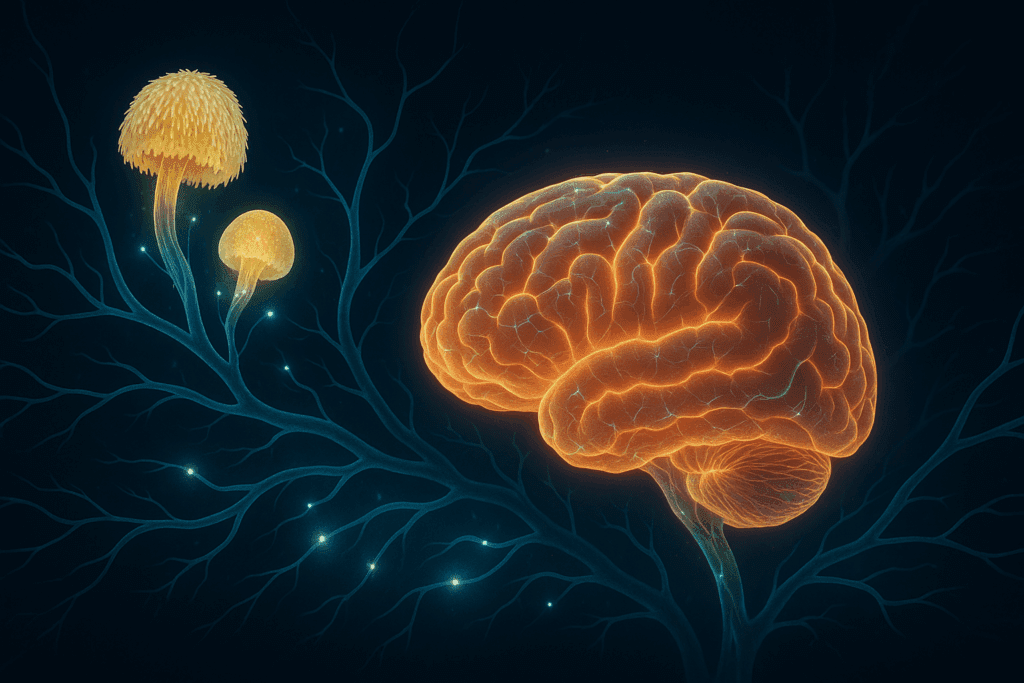
Boosting Brain-Derived Neurotrophic Factor: How Memory Mushrooms Support Neural Regeneration
One of the most compelling benefits of memory mushrooms is their ability to enhance the production of Brain-Derived Neurotrophic Factor (BDNF). BDNF is a protein associated with neuroplasticity—the brain’s ability to form new neural connections. Increased BDNF levels are linked to improved memory, learning, and overall cognitive resilience. Low BDNF levels, conversely, are associated with neurodegenerative conditions such as Alzheimer’s disease, depression, and memory loss.
Lion’s Mane mushroom, in particular, contains two unique compounds—hericenones and erinacines—that stimulate the synthesis of BDNF and NGF. These compounds cross the blood-brain barrier, making them especially effective in promoting brain regeneration and repair. Clinical studies have shown that supplementation with Lion’s Mane can result in improved cognitive function in individuals with mild cognitive impairment. Additionally, animal studies have demonstrated increased hippocampal neurogenesis—the process by which new neurons are formed in the brain—after consistent supplementation.
In real-world applications, individuals who consume memory mushrooms often report improvements in focus, clarity, and information retention. These effects are not merely anecdotal; they align with biological processes supported by empirical research. For college students, professionals, and older adults alike, integrating memory mushrooms into a daily routine could offer a reliable strategy for enhancing mental performance without the drawbacks of pharmaceutical nootropics.
Furthermore, the ability of memory mushrooms to upregulate BDNF presents opportunities for long-term brain health. By supporting the growth of new neurons and synaptic connections, these mushrooms may provide a preventive approach to age-related cognitive decline. As our understanding of BDNF continues to evolve, the role of mushrooms for memory loss becomes even more critical in both clinical and wellness contexts.

Fighting Cognitive Decline: Memory Mushrooms and Aging Brains
One of the most pressing concerns in modern healthcare is the rise of age-related cognitive decline, including conditions like Alzheimer’s disease and other forms of dementia. While no single intervention can completely prevent these diseases, emerging research suggests that memory mushrooms can play a vital role in supporting aging brains. Their unique combination of neuroprotective, anti-inflammatory, and antioxidant properties makes them a promising tool in the battle against cognitive deterioration.
The aging brain is particularly vulnerable to oxidative stress and chronic inflammation, both of which contribute to neuronal damage and impaired cognitive function. Memory mushrooms, especially Lion’s Mane and Reishi, contain powerful compounds that help neutralize free radicals and reduce inflammatory cytokines. These effects are crucial for maintaining neural integrity and slowing the progression of neurodegenerative diseases.
Furthermore, memory mushrooms support the structural health of the brain. For example, Lion’s Mane promotes the regeneration of myelin, the protective sheath that surrounds nerve fibers and facilitates efficient communication between neurons. Damage to myelin is often observed in age-related cognitive disorders and contributes to symptoms like memory loss and decreased mental clarity.
Clinical and preclinical studies have shown that regular consumption of memory mushrooms can improve memory recall, reduce anxiety, and enhance mood—all of which are critical factors for quality of life in older adults. These benefits are not only therapeutic but also preventive, positioning mushrooms good for memory as a foundational component of healthy aging strategies.
For caregivers and healthcare providers, incorporating memory mushrooms into the diets of elderly patients could serve as a low-risk, high-reward intervention. Given their adaptability and minimal side effects, they are particularly well-suited for long-term use in cognitive wellness programs.

Enhancing Focus and Productivity: The Everyday Cognitive Edge
In today’s fast-paced, multitasking world, maintaining focus and productivity has become a daily challenge. Whether you’re a student juggling coursework, a professional navigating complex projects, or simply managing everyday responsibilities, sustaining mental clarity is critical. Memory mushrooms offer a natural solution for enhancing focus without the jittery side effects commonly associated with stimulants like caffeine.
The key lies in the way memory mushrooms modulate neurotransmitter levels and reduce mental fatigue. Lion’s Mane, for instance, has been shown to increase the availability of acetylcholine, a neurotransmitter essential for attention and short-term memory. By supporting efficient neurotransmission, these mushrooms enhance cognitive processing speed and mental stamina.
Additionally, memory mushrooms often contain adaptogenic properties that help regulate the hypothalamic-pituitary-adrenal (HPA) axis. This regulation mitigates the effects of stress, which is a major contributor to mental fog and decreased productivity. By promoting a balanced stress response, memory mushrooms help users maintain a calm, focused mental state even under pressure.
Real-world feedback from individuals using memory mushrooms often includes reports of improved concentration, reduced brain fog, and a sustained sense of mental energy throughout the day. These qualitative observations align with emerging quantitative research, suggesting a tangible benefit for those seeking to enhance their cognitive edge.
Incorporating memory mushrooms into a morning routine or pre-study regimen can be a game-changer for individuals who rely on mental sharpness. Whether consumed as a capsule, powder, or tea, these fungi provide a subtle yet powerful boost that enhances both focus and productivity without compromising long-term brain health.
Protecting Against Neurodegeneration: Long-Term Brain Health with a Memory Mushroom
While the immediate cognitive benefits of memory mushrooms are compelling, their long-term implications for neurodegenerative disease prevention are perhaps even more significant. Conditions such as Alzheimer’s, Parkinson’s, and other forms of dementia involve progressive loss of neuronal function and structure. Emerging evidence suggests that memory mushrooms can play a protective role in this context.
One of the key mechanisms is the promotion of neurogenesis and synaptogenesis—the formation of new neurons and synaptic connections. This is vital for maintaining cognitive function as the brain ages. Memory mushrooms activate cellular pathways that support mitochondrial function and reduce neuroinflammation, thereby enhancing overall brain resilience.
Moreover, certain compounds found in mushrooms good for memory have been shown to inhibit the accumulation of beta-amyloid plaques and tau proteins—hallmarks of Alzheimer’s disease. By interfering with these pathological processes at a molecular level, memory mushrooms may help delay the onset or progression of neurodegenerative conditions.
In addition to these molecular benefits, memory mushrooms support vascular health, which is closely tied to cognitive performance. Improved blood flow to the brain ensures a consistent supply of oxygen and nutrients, further reinforcing mental acuity and reducing the risk of ischemic injury.
Given their multi-targeted action, memory mushrooms offer a comprehensive approach to cognitive health. Rather than acting as a single-point solution, they work synergistically with the body’s own systems to maintain and protect brain function. This makes them particularly appealing for those interested in proactive and preventative brain care strategies.
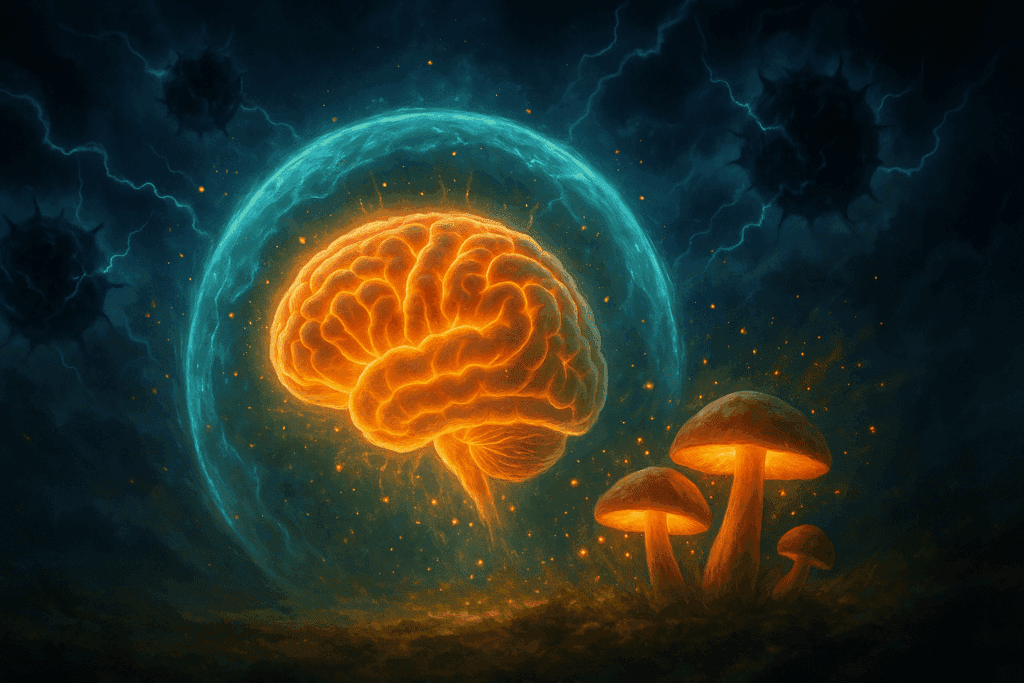
Strengthening Emotional Resilience: Mental Health Benefits of Memory Mushrooms
Cognitive health does not exist in isolation; it is deeply intertwined with emotional well-being. Stress, anxiety, and mood disorders can significantly impair memory and mental clarity. Fortunately, memory mushrooms offer benefits that extend beyond cognition, helping to stabilize mood and enhance emotional resilience.
The adaptogenic properties of memory mushrooms help regulate cortisol levels, the body’s primary stress hormone. Chronic stress and elevated cortisol are known to negatively impact memory consolidation and retrieval. By modulating the stress response, memory mushrooms create a more favorable environment for cognitive function.
Additionally, some memory mushrooms influence levels of serotonin and dopamine, neurotransmitters associated with mood regulation. Improved balance of these chemicals can lead to enhanced emotional stability, reduced anxiety, and a greater sense of mental clarity. These effects are particularly valuable for individuals navigating high-pressure environments or coping with mood disorders.
Emerging research also suggests that mushrooms for mental clarity may influence the gut-brain axis—the complex communication network between the digestive system and the central nervous system. By supporting gut health, these fungi indirectly contribute to emotional and cognitive balance, further highlighting their multifaceted benefits.
Personal accounts often include reports of improved mood, better sleep quality, and reduced anxiety after consistent supplementation. These improvements not only support mental health but also enhance cognitive performance by reducing the mental noise that often accompanies emotional distress.
Incorporating memory mushrooms into a holistic wellness routine can thus provide both cognitive and emotional benefits, reinforcing the idea that a healthy brain is also a balanced mind.
Memory Mushrooms for Students and Professionals: Real-World Applications
As the demand for cognitive performance continues to rise, students and professionals are increasingly turning to memory mushrooms for a natural mental boost. These fungi offer a practical, sustainable alternative to synthetic nootropics, making them ideal for those who require sustained focus and high mental output.
For students, memory mushrooms can enhance learning by improving attention span, memory consolidation, and recall. This is particularly beneficial during periods of intensive study or exam preparation, when cognitive load is at its highest. Studies have shown that consistent use of memory mushrooms leads to measurable improvements in working memory and verbal fluency—skills that are crucial for academic success.
Professionals, especially those in cognitively demanding roles, also stand to benefit. Whether it’s problem-solving, strategic planning, or creative work, the enhanced mental clarity and focus provided by memory mushrooms can improve performance and productivity. Unlike stimulants, these mushrooms do not lead to a post-use crash, making them suitable for sustained daily use.
The versatility of consumption methods—capsules, powders, teas, or infused coffee blends—makes it easy to integrate memory mushrooms into a daily routine. This ease of use, combined with their broad-spectrum benefits, makes them an accessible and effective tool for cognitive enhancement across diverse user groups.
Moreover, the low risk of side effects and interactions with other supplements or medications makes memory mushrooms a safe choice for long-term use. For students and professionals seeking an edge that aligns with a health-conscious lifestyle, memory mushrooms provide a balanced, evidence-based solution.
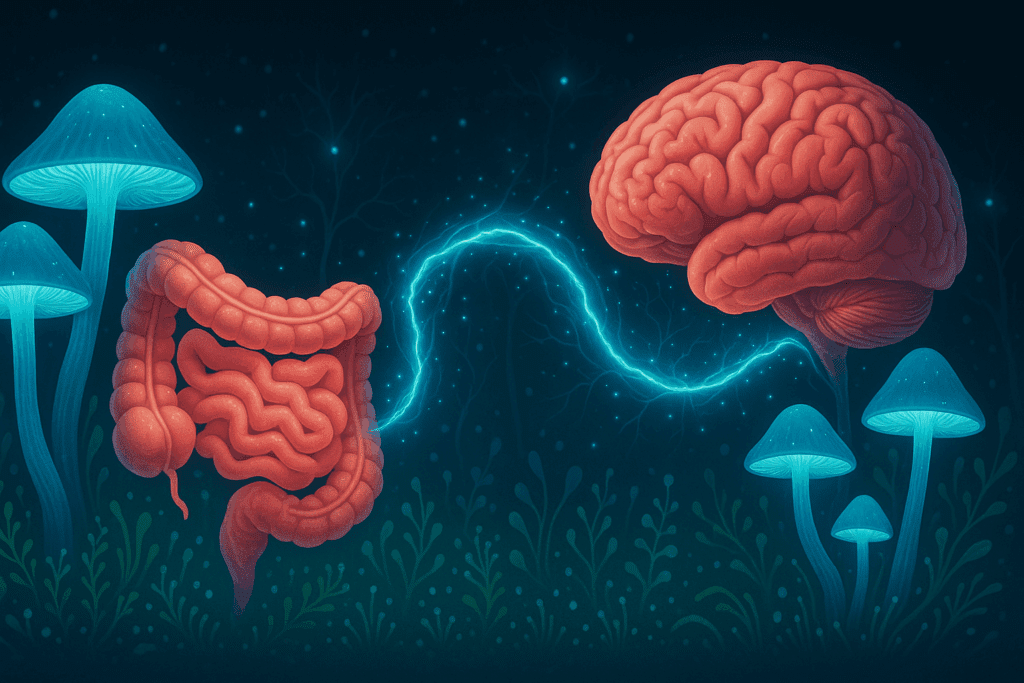
Memory Mushrooms and the Gut-Brain Axis: An Overlooked Cognitive Pathway
Recent advancements in neuroscience have underscored the profound connection between the gut and the brain, often referred to as the gut-brain axis. This bidirectional communication system influences not only digestion but also emotional and cognitive health. Interestingly, memory mushrooms have emerged as a natural intervention capable of modulating this axis, enhancing both brain function and mood regulation. The prebiotic properties found in many memory mushrooms, particularly Lion’s Mane and Reishi, support the growth of beneficial gut bacteria. These bacteria, in turn, produce neurotransmitters such as serotonin and dopamine, which play vital roles in maintaining mental clarity and emotional balance.
Scientific studies have shown that individuals with diverse and healthy gut microbiomes tend to exhibit better cognitive flexibility and memory retention. By nourishing the gut microbiome, memory mushrooms indirectly improve mental performance and resilience to stress. This pathway is especially significant for individuals who experience brain fog or mental fatigue as a result of digestive disturbances or chronic inflammation.
Moreover, the anti-inflammatory and immunomodulatory effects of memory mushrooms further reinforce the integrity of the gut lining, reducing permeability and preventing systemic inflammation that could impair brain function. This creates a stable internal environment conducive to optimal cognitive performance. Practical applications include using memory mushrooms as part of a daily dietary supplement or functional food to maintain gut-brain harmony.
For those seeking comprehensive cognitive enhancement, understanding and leveraging the gut-brain axis represents an advanced and integrative approach. Memory mushrooms offer a simple yet scientifically grounded way to support this complex system, delivering benefits that go beyond traditional nootropic strategies. As the field of nutritional psychiatry grows, so too does the relevance of memory mushrooms for both mental and digestive health.
The Role of Antioxidants in Memory Mushrooms: Defending the Brain from Oxidative Stress
Oxidative stress is a key contributor to cognitive decline, particularly as it relates to aging and neurodegenerative diseases. It results from an imbalance between free radicals and the body’s ability to neutralize them, leading to cellular damage and inflammation. Memory mushrooms are rich in natural antioxidants that help mitigate these effects, making them a powerful ally in protecting brain health.
Compounds such as ergothioneine and glutathione, commonly found in mushrooms good for memory, act as scavengers of free radicals and prevent oxidative damage to neurons. This is particularly crucial in brain regions like the hippocampus and prefrontal cortex, which are responsible for memory formation and executive function. By preserving the structural integrity of these regions, memory mushrooms help maintain cognitive sharpness and mental agility.
Moreover, antioxidants in memory mushrooms enhance mitochondrial function within neurons. Mitochondria are the energy factories of cells, and their efficiency directly affects mental energy, focus, and endurance. Improved mitochondrial health translates to better concentration, faster information processing, and reduced mental fatigue, especially during periods of high cognitive demand.
Another key benefit is the reduction of chronic inflammation, which often accompanies oxidative stress. Inflammation in the brain, or neuroinflammation, has been linked to conditions like depression, Alzheimer’s disease, and general cognitive impairment. The dual antioxidant and anti-inflammatory action of memory mushrooms makes them an essential component of any neuroprotective strategy.
From a practical standpoint, incorporating memory mushrooms into the diet through extracts, teas, or fortified foods can provide a consistent source of these protective compounds. As public awareness of oxidative stress and its effects on brain health continues to rise, memory mushrooms are poised to become a cornerstone of preventive cognitive care.
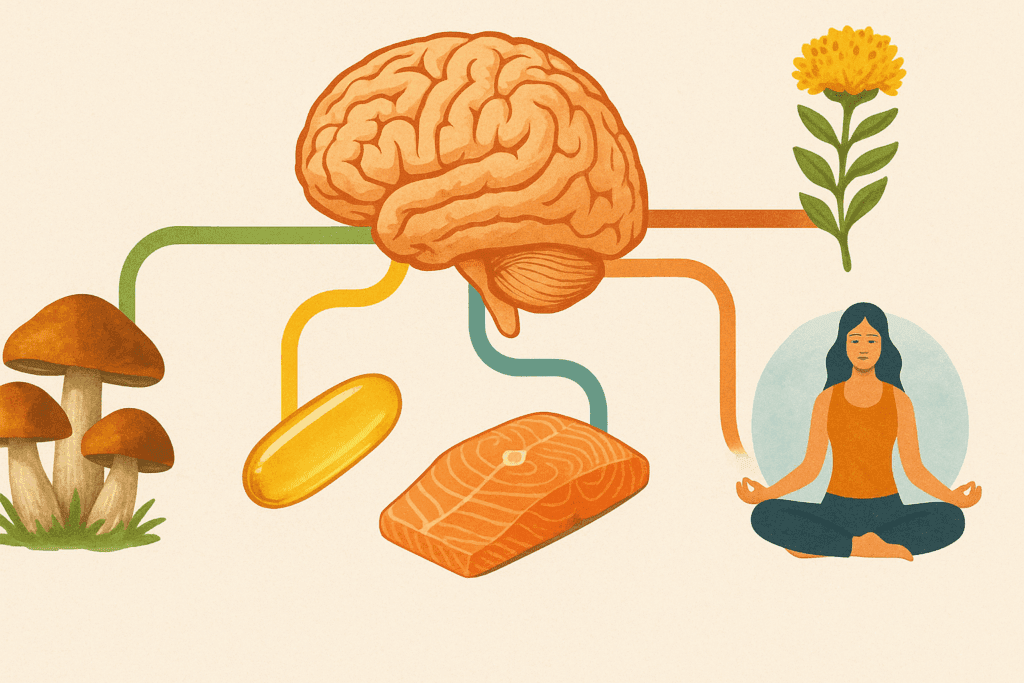
Cognitive Synergy: Pairing Memory Mushrooms with Other Nootropic Strategies
While memory mushrooms offer numerous cognitive benefits on their own, their effects can be amplified when combined with other evidence-based nootropic strategies. This approach, known as cognitive stacking or synergy, leverages complementary mechanisms to maximize mental performance and brain health.
For example, pairing memory mushrooms with omega-3 fatty acids, particularly DHA, enhances neurogenesis and synaptic plasticity. Omega-3s are known to support membrane fluidity in neurons, while memory mushrooms stimulate nerve growth and connectivity. Together, they promote faster signal transmission, improved memory retention, and greater adaptability in learning environments.
Another synergistic pairing involves memory mushrooms and B-vitamins. B-complex vitamins are essential cofactors in neurotransmitter synthesis and energy metabolism. When taken alongside memory mushrooms, they enhance the body’s ability to produce acetylcholine and other critical neurotransmitters, supporting attention, motivation, and long-term memory. This combination is especially useful for individuals experiencing cognitive fatigue or age-related memory decline.
Adaptogens like Rhodiola rosea and Ashwagandha also pair well with memory mushrooms, as they further modulate the stress response and enhance resilience. Together, they stabilize mood, reduce anxiety, and improve focus—a trifecta of benefits for those in high-pressure academic or professional settings. The cumulative effect of these combinations provides both immediate and sustained cognitive support.
Finally, lifestyle interventions such as mindfulness meditation, aerobic exercise, and adequate sleep further enhance the efficacy of memory mushrooms. These practices improve BDNF levels, reduce cortisol, and promote brain plasticity, all of which align with the cognitive goals supported by memory mushroom supplementation.
By adopting a holistic and integrative approach, users can unlock the full potential of memory mushrooms. Strategic pairings create a rich environment for cognitive optimization, allowing individuals to thrive mentally across a variety of life stages and demands.
Frequently Asked Questions About the Benefits of a Memory Mushroom
1. How long does it typically take to notice the effects of a memory mushroom?
For most individuals, the noticeable cognitive effects of a memory mushroom begin to manifest after consistent use over a two to four-week period. This timeframe allows for the accumulation of key neuroactive compounds like hericenones and erinacines, which stimulate nerve growth and brain plasticity. However, results can vary depending on dosage, individual metabolism, and existing neurological health. In some cases, users may observe subtler changes such as reduced brain fog or a mild enhancement in concentration within the first few days. Long-term benefits, particularly related to memory retention and mental clarity, generally become more apparent with sustained, daily supplementation over several months.
2. Can a memory mushroom improve short-term memory, or does it primarily support long-term cognitive health?
While the most widely studied benefits of memory mushrooms revolve around long-term cognitive protection and neurogenesis, these fungi also offer support for short-term memory functions. Certain compounds enhance acetylcholine activity, which plays a crucial role in short-term memory formation and recall. Users frequently report improvements in tasks requiring working memory, such as studying or multitasking, especially under stress. Moreover, memory mushrooms help improve synaptic plasticity, making the brain more agile in processing and retaining new information. This dual impact makes them particularly useful for students or professionals engaged in demanding intellectual activities.
3. Are there specific dietary habits that enhance the effectiveness of mushrooms for memory loss?
Yes, pairing memory mushrooms with a nutrient-dense diet can significantly improve their bioavailability and efficacy. Omega-3 fatty acids, found in flaxseeds, chia seeds, and fatty fish, help maintain the fluidity of neuronal membranes, enhancing the uptake of memory-enhancing compounds. Additionally, foods rich in polyphenols, such as berries, green tea, and dark chocolate, can synergize with the antioxidant properties of memory mushrooms. Including fermented foods in the diet also promotes gut health, further strengthening the gut-brain axis and amplifying the effects of these functional fungi. Avoiding processed foods and refined sugars is equally important, as these can contribute to neuroinflammation and diminish cognitive performance.
4. How do memory mushrooms interact with other natural supplements or prescription medications?
Memory mushrooms are generally well tolerated and have a low risk of interactions when used alongside most natural supplements. However, their adaptogenic properties and influence on neurotransmitters may amplify or interfere with certain prescription medications, particularly antidepressants, anxiolytics, or antiepileptic drugs. For example, individuals on SSRIs should consult with a healthcare provider before using memory mushrooms, as combined serotonin activity may lead to unwanted side effects. Similarly, combining memory mushrooms with other nootropics or stimulants may enhance their effects but should be done with care and professional guidance. As with all supplements, personalized medical consultation is the safest approach, especially for individuals managing chronic health conditions.
5. What distinguishes mushrooms for mental clarity from other cognitive enhancers like caffeine or ginkgo biloba?
Mushrooms for mental clarity offer a multifaceted, sustainable approach to cognitive enhancement that differs fundamentally from stimulants like caffeine or traditional herbal remedies like ginkgo biloba. Rather than providing a temporary spike in alertness, memory mushrooms work at a cellular level to promote long-term neural regeneration and balance neurotransmitter levels. This results in more stable energy, reduced mental fatigue, and enhanced focus without the crashes or jitteriness common with stimulants. Additionally, mushrooms for mental clarity support emotional resilience, which is often overlooked in other cognitive enhancement approaches. Their ability to engage multiple physiological systems makes them uniquely well-suited for individuals seeking a holistic mental performance upgrade.
6. Is there a best time of day to take a memory mushroom supplement for optimal results?
The timing of memory mushroom supplementation can influence its effectiveness, depending on individual goals. For enhanced focus and productivity, taking a memory mushroom supplement in the morning or early afternoon is often recommended. This timing aligns with the body’s natural cortisol rhythm, allowing the adaptogenic and nootropic effects to support mental clarity during peak cognitive hours. However, some users prefer taking memory mushrooms in the evening due to their calming, stress-regulating effects, which can enhance sleep quality and overnight memory consolidation. Ultimately, the best timing depends on your unique schedule, stress patterns, and the specific formulation of the supplement being used. Split dosages are also an option for sustained benefits throughout the day.
7. How do mushrooms good for memory contribute to emotional balance and mental wellness?
Mushrooms good for memory not only improve cognitive performance but also contribute significantly to emotional well-being. Their influence on neurotransmitters like serotonin and dopamine helps regulate mood, reduce anxiety, and combat symptoms of mild depression. Additionally, by lowering cortisol levels and modulating the body’s stress response, these mushrooms provide psychological stability that complements their mental clarity effects. For individuals dealing with chronic stress, burnout, or emotional fatigue, the dual-action support from memory mushrooms can offer a meaningful path to both cognitive and emotional restoration. Over time, this emotional resilience fosters greater consistency in focus, memory, and decision-making.
8. Can the regular use of mushrooms for memory loss benefit individuals without cognitive impairments?
Absolutely. While mushrooms for memory loss are often discussed in the context of age-related cognitive decline or neurological disorders, their benefits extend to healthy individuals as well. Their neuroprotective compounds can help build cognitive reserves, enhancing brain resilience against future stressors or aging. Young adults and professionals often use them proactively to sharpen focus, manage mental fatigue, and maintain mental agility in high-performance settings. These mushrooms can also support individuals undergoing lifestyle transitions, such as returning to school, starting a new job, or managing parenthood. Even in the absence of impairment, their regular use can yield meaningful enhancements in mental stamina and overall brain health.
9. What emerging research or innovations are advancing the use of memory mushrooms in neuroscience?
Recent innovations in biotechnology and neuroscience are significantly advancing our understanding of memory mushrooms. Researchers are exploring how isolated bioactive compounds from memory mushrooms can be synthesized and used in targeted therapies for neurodegenerative diseases. There are ongoing clinical trials examining their effects in early-stage Alzheimer’s patients, focusing on their ability to modulate amyloid-beta accumulation and tau protein tangles. In the field of bioinformatics, AI-driven analysis is helping identify new mushroom species with similar cognitive-enhancing profiles. Additionally, advancements in delivery systems—such as liposomal encapsulation and sublingual sprays—are improving the bioavailability of memory mushroom extracts. These developments signal a future where mushrooms play an increasingly prominent role in both preventive and therapeutic brain health strategies.
10. Are there unique cultural or traditional practices that incorporate memory mushroom usage?
Yes, various cultures have long incorporated mushrooms for mental clarity and cognitive resilience into their traditional healing practices. In East Asian medicine, particularly in China and Japan, Lion’s Mane has been used for centuries to enhance mental function and spiritual clarity among scholars and monks. Indigenous Siberian cultures have used specific mushrooms in ceremonial contexts to promote mental clarity and meditative focus. In modern Western herbalism, memory mushrooms are often blended with other adaptogens and brain tonics as part of comprehensive cognitive wellness programs. These cultural applications reflect a broader understanding of mushrooms as tools for enhancing not only intellectual capacity but also emotional insight and spiritual awareness. As global interest in integrative medicine grows, traditional wisdom is increasingly informing modern applications of mushrooms for memory loss and mental clarity.
Conclusion: The Lasting Cognitive Power of a Memory Mushroom
In an increasingly overstimulated and cognitively demanding world, the pursuit of enhanced mental performance and long-term brain health has never been more important. Memory mushrooms offer a natural, scientifically supported path to sharper focus, improved memory, and overall neurological well-being. From boosting brain-derived neurotrophic factor to protecting against neurodegeneration, these remarkable fungi embody a multifaceted approach to cognitive care.
As research continues to validate their benefits, the use of mushrooms for memory loss and mental clarity will likely expand, not only among wellness enthusiasts but also within clinical and academic settings. Their ability to support emotional balance, enhance focus, and safeguard brain health makes them an essential tool in the modern cognitive toolkit. Whether you’re a student striving for academic excellence, a professional optimizing productivity, or an older adult investing in healthy aging, memory mushrooms offer a compelling, holistic option.
Ultimately, integrating memory mushrooms into one’s daily routine is more than just a trend—it is a meaningful step toward a sharper, healthier, and more resilient mind. As part of a balanced lifestyle, these powerful nootropic mushrooms represent both ancient wisdom and cutting-edge science in the quest for cognitive excellence.
Further Reading :
Mushroom Supplements for Memory & Cognition
Medicinal Mushrooms Help Fight Cognitive Decline & Protect Your Brain
